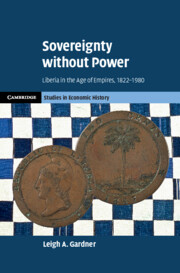Book contents
- Sovereignty without Power
- Cambridge Studies in Economic History
- Sovereignty without Power
- Copyright page
- Dedication
- Contents
- Figures
- Maps
- Tables
- Preface
- Acknowledgments
- 1 Reconstructing the Fragments
- Part I Foundations
- Part II The Art of Survival
- 4 Trade, Globalization, and Sovereignty
- 5 From Paper to Gold
- 6 The Costs of Foreign Capital
- 7 Financial Controls and Forced Labor
- Part III Sovereignty for Sale?
- Book part
- References
- Index
6 - The Costs of Foreign Capital
from Part II - The Art of Survival
Published online by Cambridge University Press: 27 October 2022
- Sovereignty without Power
- Cambridge Studies in Economic History
- Sovereignty without Power
- Copyright page
- Dedication
- Contents
- Figures
- Maps
- Tables
- Preface
- Acknowledgments
- 1 Reconstructing the Fragments
- Part I Foundations
- Part II The Art of Survival
- 4 Trade, Globalization, and Sovereignty
- 5 From Paper to Gold
- 6 The Costs of Foreign Capital
- 7 Financial Controls and Forced Labor
- Part III Sovereignty for Sale?
- Book part
- References
- Index
Summary
Formal recognition of Liberia’s sovereignty offered the government the opportunity to borrow on international markets that were growing rapidly during the second half of the nineteenth century. However, like other independent countries, Liberia would often find the terms on which it was able to borrow excessively costly, particularly as compared with colonized countries – a gap described in literature on sovereign debt as the "empire effect." Literature on the "empire effect" has thus far neglected any region of Africa outside of South Africa. This chapter focuses on Liberia’s efforts to borrow, beginning with the first loan the government raised in London in 1871. The terms of this loan were such that the government had little choice but to go into default. After renegotiating with its creditors, the Liberian government tried to return to the market but could only do so under what are described in the literature on sovereign debt as “supersanctions,” or infringements on the sovereignty of the borrowing country as a condition of borrowing. Literature on supersanctions has speculated that they replicated formal colonial rule. By comparing Liberia’s experience to that of British colonies in West Africa, this chapter shows that this was not the case: despite supersanctions which eventually extended the reach of foreign officials to include control over Liberia’s finances and its military, investors overseas neverregarded Liberia as a sound investment.
- Type
- Chapter
- Information
- Sovereignty without PowerLiberia in the Age of Empires, 1822–1980, pp. 139 - 162Publisher: Cambridge University PressPrint publication year: 2022

